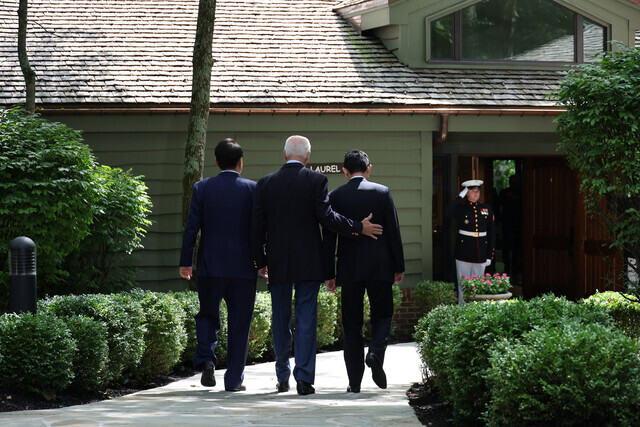hankyoreh
Links to other country sites 다른 나라 사이트 링크
[Editorial] Quasi-alliance with US, Japan carries risks – but Yoon’s happy to ignore them

South Korea, the US and Japan have taken the first step toward a quasi-alliance.
At their summit held on Friday at Camp David, the leaders of the three countries adopted a “commitment to consult” policy to coordinate joint response actions to regional challenges, provocations, and threats, and formalized the launch of a comprehensive and multi-layered cooperation system for keeping China and North Korea in check.
This is a watershed moment in international affairs, and one that poses significant challenges for South Korea’s diplomacy.
President Yoon Suk-yeol, US President Joe Biden, and Japanese Prime Minister Fumio Kishida adopted three documents at the summit, including the “Camp David Principles,” the “Spirit of Camp David,” and the “Commitment to Consult,” to establish a comprehensive and irreversible system of cooperation among their three countries in various fields, including security, the economy, and technology.
They declared that they would begin sharing North Korean missile warning data in real time, conduct annual trilateral military exercises, formalize military cooperation, and expand the three countries’ cooperation to the Indo-Pacific region.
It was the first step toward a trilateral collective security organization, a de facto quasi-alliance, and a fundamental shift in the postwar Asian security order.
At the center of the agreement is the US strategy of containment toward China. The three leaders criticized “the dangerous and aggressive behavior supporting unlawful maritime claims that we have recently witnessed by the People’s Republic of China in the South China Sea,” and reaffirmed the “importance of peace and stability across the Taiwan Strait.”
This completes the US strategy of uniting South Korea, the US, and Japan to counter the “Chinese threat” — a move that China has reacted strongly, labeling the cooperation an “Asian version of NATO.”
Given its geopolitical position, South Korea is likely to pay the most for the escalation of tensions with China as a result of its quasi-alliance with the US and Japan. The risk of Korea becoming unwittingly roped into disputes surrounding Taiwan and the South China Sea has also increased.
South Korea must follow independent strategies in pursuit of its national interest to strengthen security cooperation in response to changes in the international order, such as the US-China hegemonic rivalry and the mounting North Korean nuclear crisis.
However, the Yoon administration is rushing to implicate South Korea deeper into the US strategy without properly explaining to the public how it plans to manage its relationship with China or the scope of trilateral cooperation.
When it comes to relations with China, the national interests of the US and Japan are not aligned with those of South Korea. It is also unclear what South Korea stands to gain from the trilateral talks and at what cost.
Moreover, in this process, Yoon has sought to leave history in the past, erasing all the efforts made by previous administrations and civil society to resolve thorny issues of history with Japan.
While the US is hailing this cooperation as “historic,” any plan that steamrolls the importance of persuading the public in favor of its own momentum will stand on shaky ground.
The Yoon administration is only choosing to emphasize the stakes of the confrontation, with no plan to resolve the North Korean nuclear issue or manage inter-Korean relations in the long term. Rather than patting himself on the back for “historic” South Korea-US-Japan cooperation, Yoon should carefully plan for the costs and risks his country may face.
The responsibility to explain and persuade the South Korean public of this radical shift in their country’s security strategy also falls on his shoulders as president.
Please direct questions or comments to [english@hani.co.kr]

Editorial・opinion
![[Column] Tariffs on China: Trump was dumb, Biden dumber [Column] Tariffs on China: Trump was dumb, Biden dumber](https://flexible.img.hani.co.kr/flexible/normal/500/300/imgdb/original/2024/0520/191716191153918.jpg) [Column] Tariffs on China: Trump was dumb, Biden dumber
[Column] Tariffs on China: Trump was dumb, Biden dumber![[Column] What if Seoul took reunification by force off the table? [Column] What if Seoul took reunification by force off the table?](https://flexible.img.hani.co.kr/flexible/normal/500/300/imgdb/original/2024/0520/3017161928630494.jpg) [Column] What if Seoul took reunification by force off the table?
[Column] What if Seoul took reunification by force off the table?- [Editorial] Intensifying US-China rivalry means Seoul must address uncertainty with Beijing sooner than later
- [Column] When ‘fairness’ means hate and violence
- [Editorial] Yoon must stop abusing authority to shield himself from investigation
- [Column] US troop withdrawal from Korea could be the Acheson Line all over
- [Column] How to win back readers who’ve turned to YouTube for news
- [Column] Welcome to the president’s pity party
- [Editorial] Korea must respond firmly to Japan’s attempt to usurp Line
- [Editorial] Transfers of prosecutors investigating Korea’s first lady send chilling message
Most viewed articles
- 1Xi, Putin ‘oppose acts of military intimidation’ against N. Korea by US in joint statement
- 2For new generation of Chinese artists, discontent is disobedience
- 3Kim Jong-un wanted to meet with residents of shelled Yeonpyeong Island in South, Moon recalls in mem
- 4To weigh costs and benefits, Korea must stop treating US troop presence as a sacred cow
- 5[Column] What if Seoul took reunification by force off the table?
- 6[Exclusive] Unearthed memo suggests Gwangju Uprising missing may have been cremated
- 7[Editorial] Transfers of prosecutors investigating Korea’s first lady send chilling message
- 8[Editorial] Intensifying US-China rivalry means Seoul must address uncertainty with Beijing sooner t
- 9Berlin mayor hints at tearing down ‘comfort women’ memorial in city
- 10How K-pop broke the internet — and broke into the US market